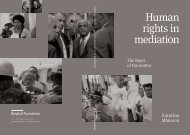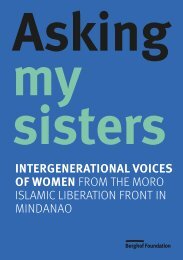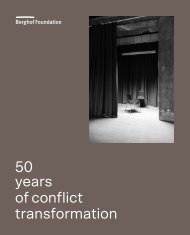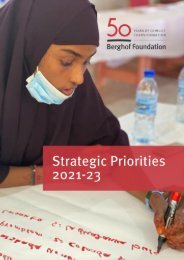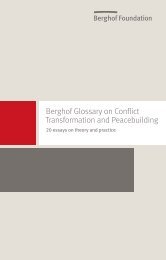Strategic Priorities 2022-2025
In order to adopt to a digitalised world, a planet facing ecocide through climate change and further global challenges, the Berghof Foundation as an organisation has to evolve as well. We are therefore expanding our activities beyond our established focal areas into six additional areas of strategic importance. How Berghof intends to go about it over the next four years is the subject of this document.
In order to adopt to a digitalised world, a planet facing ecocide through climate change and further global challenges, the Berghof Foundation as an organisation has to evolve as well. We are therefore expanding our activities beyond our established focal areas into six additional areas of strategic importance. How Berghof intends to go about it over the next four years is the subject of this document.
Create successful ePaper yourself
Turn your PDF publications into a flip-book with our unique Google optimized e-Paper software.
A people-centred approach and local ownership are already key principles of our work, which is<br />
why we – in most cases – aren’t operating through field offices but are instead working with<br />
partner organisations in the respective countries and regions that provide local expertise,<br />
contextual knowledge, and relevant networks. Our goal is to ensure sustainable conflict<br />
transformation, providing tools, building networks and increasing capacities on the ground<br />
beyond our own interventions.<br />
To maximise our impact, we will work more closely with other local and international peace<br />
actors. We believe it is vital for us to be at the centre of efforts to increase collaboration among<br />
our sister institutions and actors in our field, as well as with those who have specialised in some<br />
of our emerging focal areas.<br />
2 Communications and outreach<br />
To achieve our organisational goals, we want to become a more visible player in the field of<br />
conflict transformation and beyond. We will create opportunities to offer substantive political<br />
analysis, while also recognising the importance of confidentiality when dealing with particularly<br />
sensitive issues. We will use communications as a tool to advance peace processes, promote<br />
conflict transformation as an approach in the political sphere, and provide advice on<br />
peacebuilding agendas and policies.<br />
3 Staff development<br />
The most valuable, and fragile, asset in any peacebuilding setting – trust – is built on the<br />
expertise, experience, empathy, and social skills of our staff. Whether engaging and supporting<br />
conflict parties in mediation or negotiation, conducting trainings or carrying participatory<br />
research, all of our core activities depend on highly competent and committed staff. We thus<br />
strive to continue to offer a working environment that will attract skilled people from various<br />
international backgrounds.<br />
4 Design, monitoring, evaluation and learning<br />
Just as the environments we are working in are constantly changing, our approaches need to<br />
adapt and evolve. We will further invest in our design, monitoring, evaluation and learning<br />
capacities to directly support and advance our work. We want to improve our understanding,<br />
achievement and communication of peacebuilding impact by learning from past experiences.<br />
An integrated approach to project design that is based on adaptive management and constant<br />
learning will be key to our work. We will further refine a learning approach to peacebuilding and<br />
conflict transformation work. We will employ a wide range of monitoring and evaluation tools in<br />
order to analyse the impact of our projects and use key lessons in planning future projects.<br />
Page 14 | 13





